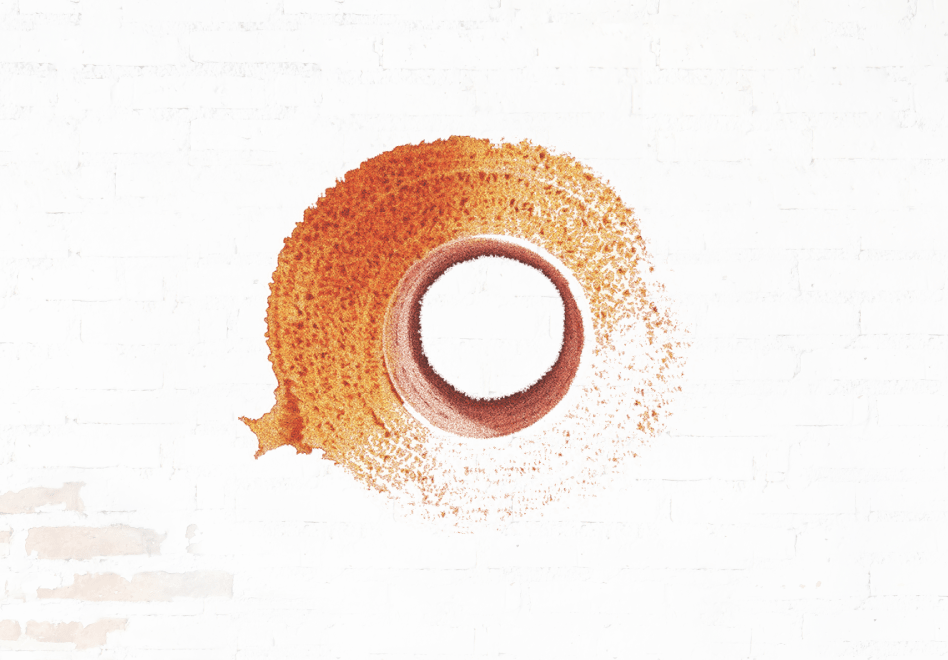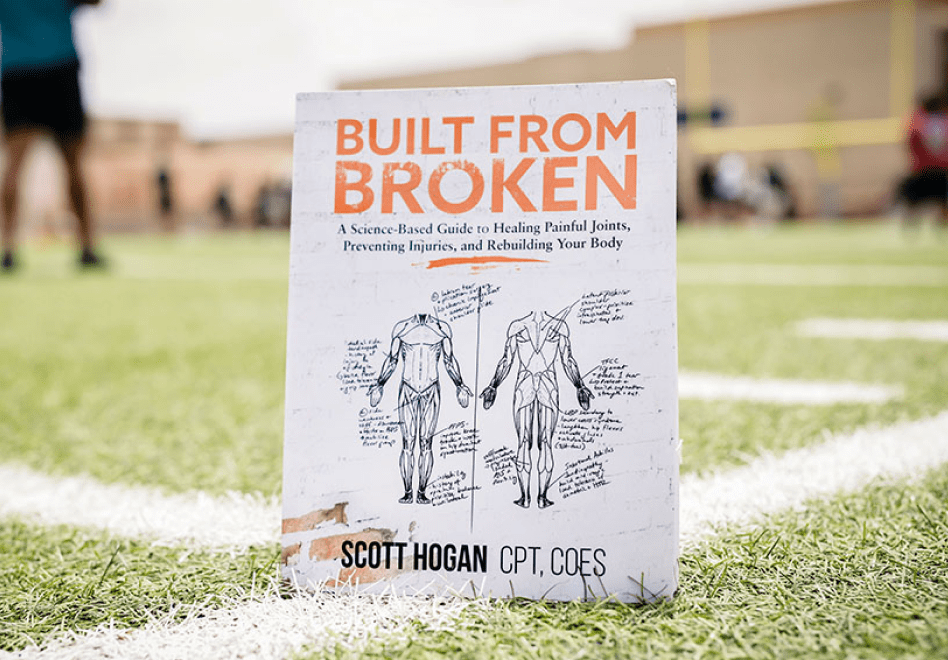
Be built (to last).
The right supplements can help you recover naturally and build a resilient body.

Supplement Quiz
Take this short quiz to discover the perfect supplements for your needs and goals.
About SaltWrap

Built from Broken
Get the best-selling book from SaltWrap founder, Scott Hogan, and start rebuilding today.
Why Hot Coffee Doesn’t Damage Your Collagen Protein
by Scott Hogan, ACE-CPT, COES
In this article, we break down:
-
The science of collagen thermal degradation, and why hot coffee does not damage collagen
-
Research-backed benefits of collagen protein supplementation
-
Why putting collagen powder in your coffee turns your morning 'joe' into a veritable superfood
Q: Does heat from coffee damage collagen?
A: No. The initial degradation temperature of collagen is 572° F. Coffee is typically brewed to around 185° F.
Reference: Thermal denaturation studies of collagen by microthermal analysis and atomic force microscopy, Biophys J. 2011
"Scientists Say Collagen in Hot Coffee Does Not Work"
"Don't Put Collagen In Your Coffee"
"Collagen in your coffee? A scientist says forget it."
"People Keep Putting Collagen in Their Coffee, And Scientists Have Weighed In"
These are the top headlines from articles that discuss why you should not put collagen in your coffee.
It seems that science indicates putting collagen into your coffee is a bad idea.
But things aren't always what they seem.
There's a lot of misinformation about collagen. On both sides.
The marketing hucksters say it's the Fountain of Youth.
And the contrarian researchers say it's a scam.
We'll get to that in a minute. But first, I want to clear up the conversation around heat and collagen.
Here's the deal with collagen in coffee:
Collagen protein (a.k.a. gelatin) is highly heat stable. It can withstand temperatures of over 500 degrees without degradation. (Reference: https://www.ncbi.nlm.nih.gov/pubmed/21723833)
Since coffee does not come close to reaching that temperature, any collagen you add to your coffee will not be damaged by the heat.
That's my short answer. But it's a loaded question that needs unpacked. So here goes:
Here's where (I think) the confusion comes from.
Denaturation means the collagen fibrils (bundles of collagen) have been broken down into their constituent collagen molecules. Virtually all research on "collagen protein" has been conducted on this form. Researchers call it gelatin.
🔬 Is it OK to bake with collagen?
Connective tissue turns into gelatin at about 160 degrees F. This is one of the reasons why cooking meat until the internal temperature surpasses this threshold is important. It liquefies the collagen, giving the meat better texture. It does not, however, render the collagen inert and unusable by the body.
Studies show 5-10 grams of collagen protein (gelatin) has joint health and skin health benefits. Maybe more. References in article below.
Undenatured collagen is a different compound from gelatin. As the name implies, it is a type of collagen that has retained its molecular structure and is still bound to glucosamine, hyaluronic acid, and all the other extracellular matrix components found naturally within connective tissue. It's typically derived from cartilage structures and is made primarily of Type II collagen.
The clinically-effective dosage of undenatured Type II collagen is much lower than collagen protein. Only 40 mg instead of 5-10 grams. It appears to work in a different manner than collagen protein too. It creates an "inoculation effect" which helps prevent your body from attacking its own cartilage structures.
Undenatured collagen shouldn't be put into coffee. You only need .04 grams per day to get the benefits, so there's no reason to put it in coffee anyway.
(By the way, some studies show that using a type II collagen matrix with all the hyaluronic acid, glucosamine, chondroitin, and other stuff still attached is beneficial vs. isolating ONLY the type II collagen. That's why we used a patented type II collagen matrix in our joint recovery supplement, Joint Clinic).
So, that's denaturation. In a nutshell.
Now, what we should really be concerned about is degradation.
Degradation means the collagen has been destroyed. Broken down so that the body can't use it in the same way. When this happens to collagen structures within your body, macrophages gobble it up and dispose of it. If a collagen supplement were to be degraded, we can safely assume that the chemical structure would be damaged enough to alter how it works as a supplement.
Not many people understand the difference between denaturation and degradation.
Attention-seeking bloggers jump at the opportunity to post a contrarian point of view, crying "COLLAGEN IS DENATURED AND KILLED BY COFFEE."
When in reality, it was already denatured before you brewed the coffee.
It's a moot point.
The real question is, "does hot coffee degrade collagen in a way that makes it unusable by the body?"
And the answer to that question is No.
In the study linked above, collagen degradation did not occur until it reached 572 degrees F.
Brewed coffee typically reaches a temperature of around 185 degrees F.
And the boiling point for water is 212 degrees F.
So unless you are literally vaporizing your coffee with temperatures that more than double boiling water, you aren't killing any collagen.
Also, the research on denatured collagen (gelatin) demonstrating joint health benefits refutes the idea that denatured collagen is useless.
So, go ahead and put that collagen protein in your hot coffee.
Why We Care About Coffee
64% of adults in the U.S. drink coffee every day according to a study by the National Coffee Association.
Every day.
The number of people who consider themselves “coffee drinkers” but aren’t necessarily daily users is even higher.
Upwards of 83% of Americans drink coffee at least occasionally based on a 2013 study.

Many scientists say hot coffee degrades collagen. But the actual science says otherwise.
Since its official birthday in 1671, this same liquid energy has been fueling morning productivity and keeping new parents awake throughout the day on little-to-no sleep.
Even though it’s a few hundred years old now, new generations are picking up the habit earlier than ever.
Millennials especially, who consume 44% of all coffee consumed in the U.S.
Once thought of as a junk-food vice, coffee is now lauded as a superfood.
Studies show coffee consumption helps with fat burning, mental focus, and may even protect you from cardiovascular disease.
But we’re not here to sell you on coffee. Or even to make you feel better about getting all hopped up on Espresso shots. (Caffeine inhibits collagen synthesis in a dose dependent manner. So limit yourself to 2-3 cups of coffee per day.)
The main reason it’s relevant to us at SaltWrap is that the vast majority of our clients drink coffee first thing in the morning.
And of those who don’t, many more drink tea. On any given day, 159 million Americans are drinking tea.
These caffeinated drinks are clearly a big part of our clients’ lives.
So it’s important we understand what is going on here.
Mainly because whether you (the client) are training for a triathlon or trying to lose 20 pounds, coffee is likely on the menu.
The question is: What, if anything, should we do about that?
Beyond the obvious — warning you to avoid putting sugar and food coloring in your coffee — we see an opportunity.

This is not how your coffee should look.
We see a delivery vehicle for getting good nutrition in your body first thing in the morning.
One of the main focuses in our practice is seamlessly integrating healthy behaviors into clients’ daily routines.
Because a good daily behavior is much more powerful than a great behavior implemented only a few times per week.
So it’d be ideal if we could sprinkle some kind of magic fairy dust into coffee that helps our clients recover from exercise better, reduce joint pain, and maintain a strong metabolism.
Enter collagen supplements.
🔬 Can I use collagen as a meal replacement?
No, it is not recommended to replace dietary protein with collagen protein because collagen lacks the essential amino acid L-tryptophan and is low in other vital amino acids like L-leucine and L-lysine.
With all the marketing buzz around collagen, it seems like the one true panacea.
The elixir that solves all of our problems.
But its not. While collagen has demonstrated benefits for joint health and connective tissue repair, it should NOT be used as a meal replacement. Sure, it's fine to use it instead of sugar-laden or artificially sweetened creamers. But it's actually quite dangerous to use collagen in place of dietary protein.
That's because collagen is not a complete protein. It only contains 8 of the 9 essential amino acids your body needs. It also lacks the amino acid leucine, an important nutrient for stimulating muscle protein synthesis.
Studies show you can safely consume as high as 36% of your daily protein from collagen while still maintaining requirements for indispensable amino acid balance. If you consume 150 grams of protein per day, you could consume upward of 50 grams of collagen protein without creating amino acid imbalances in your body. But you only need 5 to 15 grams per day (depending on the type) of collagen to get the joint, bone, and muscle health benefits.
Bottom Line: Use collagen as a joint health (and skin) supplement. Don't think of it as a "protein" or dietary meal replacement.
Collagen & Coffee: A Perfect Match
Specifically, collagen peptides.
Which means the collagen molecules that have been broken down into smaller parts, helping them dissolve more easily in liquids.
Usually this process occurs through hydrolysis—a chemical reaction with water (this is why you'll often see beverage-grade collagen supplements referred to as "hydrolyzed collagen peptides.").
When you mix collagen peptides with a morning cup of coffee, you have darn near a perfect start to the day.
First, a quality collagen protein powder will pretty much completely dissolve in a hot beverage.
Second, it has virtually no taste.
So you can add it without ruining your brew.
But what is really interesting are the many benefits of collagen on measurable health indicators.
Now, everyone is talking about collagen right now.
A quick Google search pulls up 66,700,000 results for “collagen.”
Most of those results are news-ish articles promoting its seemingly endless list of benefits.
Some are articles casting doubt on it being the literal Fountain of Youth.
And several more are links to collagen supplement brands you can order online and have delivered to your doorstep in 5-7 business days.
Like any topic that bubbles up to the top pages of news sites, what collagen ACTUALLY does has been twisted and morphed.
It’s tough to decipher what’s true and what’s hype anymore.
So we put together a short list of actual, research-backed reasons to put collagen in your morning coffee.
We’re going to stay away from referencing even reputable secondary sources.
Instead, we’ll be pulling from published studies to find out what the true confirmed benefits of collagen are.
🔬 What is collagen?
Collagen is the second most abundant substance in the human body, behind water.
And it is the most abundant protein in the human body.
It's the major building block for tendons, bones, and skin.*
As we age, our body produces less and less collagen. By age 60, our ability to produce collagen has decreased by 50%.
This leads to aging joints, saggy skin, and loss of lean muscle tissue.
By supplementing with collagen, you can give your body the raw materials it needs to build strong, stable bones and joints, and help maintain a healthy gut lining, immune system and metabolism.*
There are several types of collagen, but research shows upwards of 90% of the body’s collagen is made up of Type I and Type III collagen.
The Top 5 Reasons to Put Collagen in Your Morning Coffee
1. Collagen helps reduce joint pain and maintain joint integrity.

"According to published research, orally administered collagen hydrolysate has been shown to be absorbed intestinally and to accumulate in cartilage."
A meta-study by Nutricion Hospitalaria cited more than 60 scientific studies designed to measure the impact of collagen on joint pain and overall joint health.
Their findings showed that collagen supplementation improves joint comfort, prevents joint erosion, and helps maintain the integrity of the bone and soft tissue that make up joints.
And, interestingly, ingesting collagen improves the body’s ability to produce its own collagen.
This is good news, because collagen production typically declines rapidly with age.
Caffeine in your morning coffee wakes up your brain and nervous system, and adding collagen to your mug “wakes up” your stiff, creaky joints.
Perfect combo.
2. Collagen improves skin elasticity, tone and moisture.
A placebo-controlled study from Skin Pharmacology and Physiology showed that women who took a collagen supplement showed significant improvements in skin elasticity (how stretchy and supple your skin is) compared to those who took a placebo.
Even after 4 weeks, significantly higher skin elasticity levels were found in the women who took collagen.
Skin elasticity is important not only because it prevents skin sagging and wrinkles, but also because it’s a good indicator of overall health.
It reflects the health of the largest organ in your body.
3. Collagen supplementation may help maintain your gut lining health.

Collagen peptides help maintain the gut mucosa. Also referred to as the "gut lining" and "gastrointestinal wall" — this thin layer of membranes is designed to prevent pathogens from entering the body through the digestive system.
Health news sites like to talk about how collagen improves gut health (prevents leaky gut) but don’t explain how collagen is linked to digestive health.
This causes our B.S. flag to climb the pole… but it turns out, there is good science behind the digestive health claims.
Collagen helps support gastric juice production and maintains the health of the mucosal lining in your stomach.
But that’s not exactly nailing down how it works OR demonstrating the effectiveness of collagen on a specific biomarker.
Here’s what we think matters:
Collagen contains two key amino acids that have shown the ability to repair damaged gut lining: glycine and proline.
Glycine especially has been widely studied for its ability to repair a variety of stomach disorders.
Adding collagen to your morning coffee gives your gut some nourishment to start the day — before you have the chance to assault it with junk food.
4. Collagen supplementation supports increased collagen synthesis in injured joints.
In addition to helping prevent age related wear and tear, collagen protein also boosts collagen synthesis in joint structures.
In a small placebo-controlled study, 5-15 grams of collagen protein enriched with Vitamin C resulted in two times greater collagen mass in injured ligaments than the placebo group (measured by % of dry mass collagen).
[See Related: Patented collagen ingredients enhanced with Vitamin C]
5. Collagen may help stabilize appetite and hunger levels.
Studies like this one in Eating and Weight Disorders demonstrate that collagen helps stabilize appetite levels and reduce hunger.
If you are on a weight loss regimen, or just watching your caloric intake, adding collagen to your morning coffee is a great way to ward off cravings.
Both caffeine and collagen act as appetite suppressants.
(BONUS) Reason #6 ... It’s an easy way to create a healthy daily habit to support overall joint and muscle function.
This isn’t coming from a peer reviewed journal or anything, but it’s important.
A quality collagen supplement vanishes in hot beverages.
It has virtually no taste and it won’t ruin your cup of coffee.
And more important, if you can make collagen + coffee a habit, it will be an easy one to maintain.
Unlike swallowing those horse-sized supplement pills sitting unused in your medicine cabinet.
Honorable Mentions
There are many more benefits to collagen supplements than this list of five. But these are the most comprehensively studied benefits.
Collagen supplements also show promise for supporting your immune system, cognitive function, improving liver health, maintaining eye health, and protecting cardiovascular health.
While more research is needed to nail down exactly what collagen does for these systems and how, it’s clear that collagen is a fundamental building block of each.
Supplementing with collagen may not be a fountain of youth, but it’s about as close as it gets in the supplement world.
How to Add Collagen to Your Coffee
Add 5-10 grams of hydrolyzed collagen peptides to your morning cup of coffee or tea to support joint health, metabolic health, and several other bodily systems and organs.

Studies show you need around 5 grams of collagen per day to get both the skin health and joint health benefits. Look for hydrolyzed collagen peptides.
The Best Collagen Supplement for Joints
With so many options, you may be wondering which is the best type of collagen.
We don’t like to toot our own horn (OK, maybe a little), but we believe we’ve found it.
It's called Collagen Synthesis™.
It combines two patented, clinically supported sources of Bioactive Collagen Peptides with other key nutrients involved in connective tissue metabolism and repair.
Unlike generic collagen supplements that may be assimilated into bodily tissues at random, the types of collagen in Collagen Synthesis™ have been engineered specifically for cartilage, tendons, and ligaments.
And when you take Collagen Synthesis™ before working out, the benefits are amplified.
🔬 Summary: The Top 5 Research-Backed Reasons to Put Collagen in Your Morning Coffee
- Helps reduce joint pain and maintain joint integrity.
- Improves skin elasticity, tone, and moisture.
- May help maintain your gut lining.
- May support increased collagen synthesis in injured joints.
- Helps stabilize appetite and hunger levels.
- (Bonus) It’s an easy way to create a healthy daily habit to support overall joint function.
Founder: Scott Hogan

I created SaltWrap to bring together the most practical ideas in therapeutic sports nutrition, corrective exercise, and functional fitness — with the goal of keeping you (and myself) strong, mobile, and built to last.
I've worked as an A.C.E. Certified Personal Trainer, Orthopedic Exercise Specialist, and nutritional supplement formulator.
But more importantly — I've spent most of my life battling injuries, joint pain, and just being plain beat up. So I know what it's like to struggle toward fitness goals.
SaltWrap is here to push you through injuries, setbacks and perceived physical limitations. To a place beyond what you think you're capable of. Sign up here to stay in the loop.
Learn more about my best-selling injury prevention and recovery book, Built from Broken.








